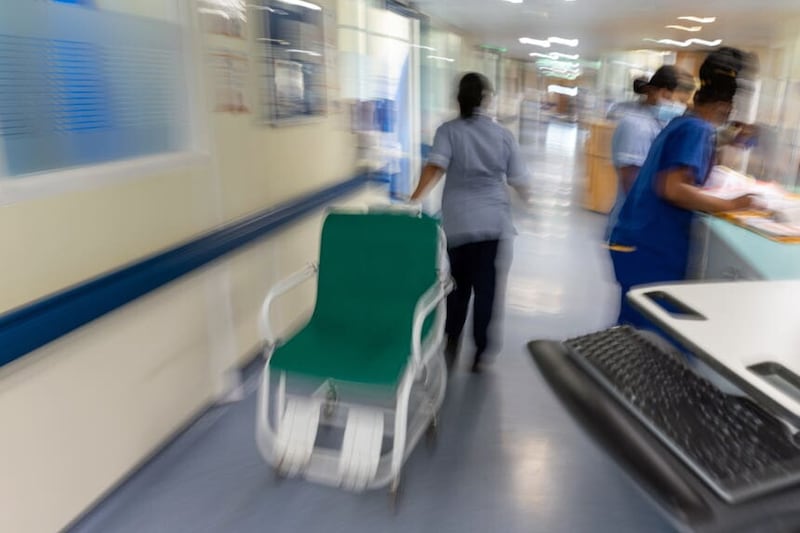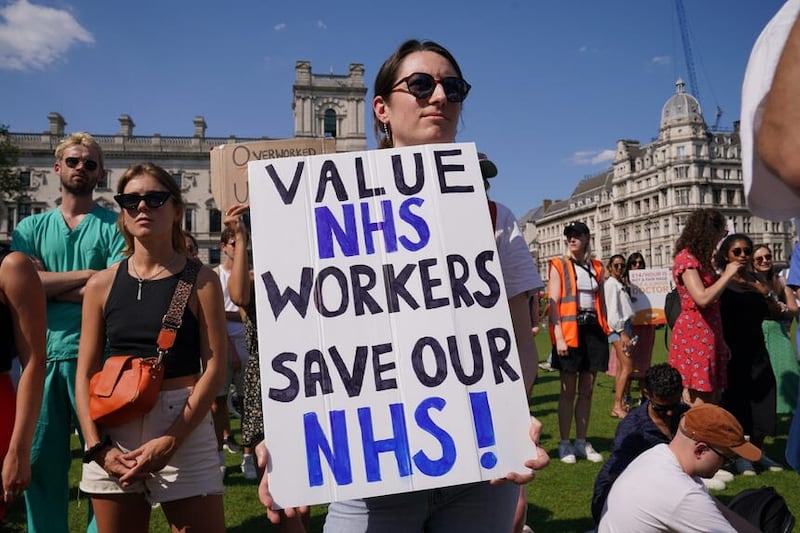Thousands of health workers in Northern Ireland are due to start two days of strikes on Thursday over a long-running pay dispute.
Members of the Unison and Unite trade unions will be striking over 48 hours, covering a wide range of health workers including paramedics, healthcare assistants, pharmacists, radiographers and health visitors.
Members of the Chartered Society of Physiotherapists (CSP) will also strike for the first time in the region over pay from 8.30am to 12.30pm on Thursday.
On Friday, the Royal College of Midwives will strike from 8am to 4pm citing a lack of progress in talks with the Secretary of State Chris Heaton-Harris.
A major rally is also set to take place outside Belfast City Hall on Friday at 12.30pm.
Please RT
— NIAS (@NIAS999) September 20, 2023
48 hour Industrial Action across HSC will be happening from 00:01 on September 21. The impact on NIAS will be significant. Please contact us only in life threatening emergency situations. Please also help us get this message out by retweeting. Thank you pic.twitter.com/0fUg5JeuQj
In May, the Department for Health’s permanent secretary Peter May said it would take “unprecedented cuts” to services to secure a pay increase for 2023/24 under the current budget.
This contrasts with health workers in England, who were offered a five per cent increase and one-off payment of around £1,655.
Read more:
- Department of Health warns patients of 'significant disruption' ahead of health strikes
- Royal College of Midwives announce day of strike action across north
Karen Murray, the RCM’s Director for Northern Ireland, said “deeply frustrated” midwives had been driven to take a stand for fair pay and safer conditions.
She said the safety of all women would remain the prime concern during industrial action, with midwives and maternity support workers staffing units to ensure women receive the care they need.
“Morale is at rock bottom and staff face a real impact on their physical and mental health. Our members are taking a stand,” she said.
A spokesperson for the Northern Ireland Ambulance Service said it had engaged with trade unions to identify areas exempt from strike action, allowing for responses to the most clinically urgent patients.
Anticipating “lengthy delays” for less clinically urgent calls, the public has been urged only to call for an ambulance in life-threatening emergencies such as cardiac arrest, loss of consciousness, breathing difficulties and severe bleeding.
After placing 999 calls, the public are also asked not to call back to check on arrival times in order to free up phone lines.
Stephanie Heasley, the CSP’s Northern Ireland representative, said that years of real-term pay cuts during a cost-of-living crisis was causing “irreversible damage” for physiotherapy staff who are the lowest paid in the UK.
“We have more staff in debt management programmes, using food banks and working additional employment to balance the books,” she said.
“The knock-on effect is an increase in burnout and stress amongst staff, increase in sickness absence levels and poor retention of staff.
“Patient safety is compromised due to the lack of front-line staff and many staff are regularly working unpaid hours due to the increase in workload.”
Unite’s lead regional officer for health, Kevin McAdam, said that it was inevitable that workers would go elsewhere if pay did not improve.
“Low pay is driving a staffing crisis that is undermining our health service. Lost services mean unacceptable delays and barriers for those needing life-saving treatments and pressure to ‘go private’,” he said.
“The resulting reliance on private sector recruitment agencies and locum staffing poses unsustainable costs to the public purse.”
Sinn Féin MLA Linda Dillon said it was past time for the British government to deliver a fair deal for a system at “breaking point”.
“Staff are stretched to the limit and burnt out from working long hours, while also dealing with chronic under-staffing which has heaped extra pressure on already stretched workers,” she said.
“This is unsafe and is putting both patients and staff at risk."







